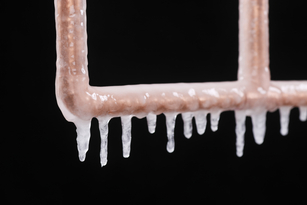
Last year we published a blog post about how to prevent your pipes from freezing during the cold times we experience in the Denver, Colorado area. This year we're going to go into detail on what to do if your pipes do unfortunately freeze.
First, you need to locate the frozen area of pipe. Hopefully there is just one place where the pipe has ice in it. To do so, test all your faucets in the house to see which are working and which are not. Leave all faucets slightly open to allow a trickle of water. This can prevent further freezing. Leave any blocked faucets open as well. This can help decrease pressure inside the pipe to hopefully prevent further pipe expanding or splitting. If one faucet is working and another is not, then the freeze is likely in the pipe between the two. Many homes have pipes in the external wall as well, so check those as they are likely problem areas. If you have been able to narrow down the area of plumbing that is giving you the cold shoulder, then look for the ways to access that pipe without tearing into any walls. These are some problem areas to check:
Next, you need to examine the affected area for cracks or leaks. To look at the backside of pipes that are facing away from you, use a flashlight and a handheld mirror. Hardware stores usually carry larger dental-type mirrors. If you find a crack or leak, immediately shut of the main water valve and call a plumber to come fix it. Place a bucket or some sort of container to catch water under the broken pipe. Even if it is not leaking at the moment, it could start to leak once it thaws.
If you are fortunate enough to not have any pipe damage, it's time to start thawing your frozen pipes. Hopefully your faucet testing has given you a clue as to the area where the pipes are probably frozen. If you are lucky enough to have an infrared thermometer, then use it to determine the exact part of the pipe that has clogged with ice. If not, there are some tricks to help you detect where the issue is. Try simply using your hand to feel if there are section of plumbing that are colder than the rest. It will all feel cold, but you might be able to feel where it feels the coldest. Also, use a metal screwdriver or some other handheld metal object to gently tap the pipes. There should be a different sound and feel when you hit a frozen section that will sound more like a solid "thud" and less hollow. Test against pipes in your house you know aren't frozen.
Now comes the thawing. Remember, all faucets should be open to a trickle.If you find any cracks during the thawing, turn off your main water valve immediately and call a plumber as previously noted in this post. PVC pipe can be damage by temperatures over 140 degrees F. So anything stronger than a hair dryer (like a heat gun) is probably not a good idea. Outdoor valves can have fiber washers or other non-heat-safe components, so heats those carefully. We do NOT suggest ever using an open flame, unless it is an emergency and your only recourse. There are several better ways to thaw the pipe. We suggest getting a hair dryer or heat gun to work on thawing the problem area. Do NOT leave the heat stationary or the nozzle touching the pipe directly. Move the heat source back and forth along the frozen section of pipe. Uneven and sudden temperature change could also cause the pipe to crack. Here are some other ways to help thaw your pipes:
Here in Colorado, freezing pipes is an issue that comes along every winter. Often insurance companies can neglect the full extent of the damage when frozen pipes occur. If you have any damage from frozen pipes, please give us a call so that we can make sure you and your home is being properly and professionally taken care of.
First, you need to locate the frozen area of pipe. Hopefully there is just one place where the pipe has ice in it. To do so, test all your faucets in the house to see which are working and which are not. Leave all faucets slightly open to allow a trickle of water. This can prevent further freezing. Leave any blocked faucets open as well. This can help decrease pressure inside the pipe to hopefully prevent further pipe expanding or splitting. If one faucet is working and another is not, then the freeze is likely in the pipe between the two. Many homes have pipes in the external wall as well, so check those as they are likely problem areas. If you have been able to narrow down the area of plumbing that is giving you the cold shoulder, then look for the ways to access that pipe without tearing into any walls. These are some problem areas to check:
- Pipes in or near uninsulated crawlspaces, attics, or basements.
- Pipes near cold air vents or cold concrete.
- Outdoor valves and spigots.
- Outdoor pipes can freeze, but check these last, as most systems are designed to keep standing water out of these pipes.
Next, you need to examine the affected area for cracks or leaks. To look at the backside of pipes that are facing away from you, use a flashlight and a handheld mirror. Hardware stores usually carry larger dental-type mirrors. If you find a crack or leak, immediately shut of the main water valve and call a plumber to come fix it. Place a bucket or some sort of container to catch water under the broken pipe. Even if it is not leaking at the moment, it could start to leak once it thaws.
If you are fortunate enough to not have any pipe damage, it's time to start thawing your frozen pipes. Hopefully your faucet testing has given you a clue as to the area where the pipes are probably frozen. If you are lucky enough to have an infrared thermometer, then use it to determine the exact part of the pipe that has clogged with ice. If not, there are some tricks to help you detect where the issue is. Try simply using your hand to feel if there are section of plumbing that are colder than the rest. It will all feel cold, but you might be able to feel where it feels the coldest. Also, use a metal screwdriver or some other handheld metal object to gently tap the pipes. There should be a different sound and feel when you hit a frozen section that will sound more like a solid "thud" and less hollow. Test against pipes in your house you know aren't frozen.
Now comes the thawing. Remember, all faucets should be open to a trickle.If you find any cracks during the thawing, turn off your main water valve immediately and call a plumber as previously noted in this post. PVC pipe can be damage by temperatures over 140 degrees F. So anything stronger than a hair dryer (like a heat gun) is probably not a good idea. Outdoor valves can have fiber washers or other non-heat-safe components, so heats those carefully. We do NOT suggest ever using an open flame, unless it is an emergency and your only recourse. There are several better ways to thaw the pipe. We suggest getting a hair dryer or heat gun to work on thawing the problem area. Do NOT leave the heat stationary or the nozzle touching the pipe directly. Move the heat source back and forth along the frozen section of pipe. Uneven and sudden temperature change could also cause the pipe to crack. Here are some other ways to help thaw your pipes:
- Wrap electrical heating tape around the frozen pipe. This can be purchased and many hardware stores.
- Heat the surrounding air by pointing a space heater, bare incandescent light bulb, or heat lamp at the area of problematic pipe.
- Salt lowers the freezing point of water. If the problem area is below a sink or drain, you can try dissolving a tablespoon or so of salt into a half cup of water and pouring that down the drain. The water temperature should not be any hotter than warm. Pouring very hot or boiling water into the pipe can cause a sudden temperature change that can cause the pipe to crack.
- Wrap the pipe in hot towels. Soak a towel in hot water and wrap it around the pipe. Replace every ten minutes. Make sure you have a bucket or pot to catch the dripping water. Do NOT leave cold wet towels on the pipes.
- If there is any type of external vent in the particular section of wall, you can space heaters to heat the air through the vent.
- Try turning up the central heat in your home to 75 or 80 degrees F., and leave it that way for a 2-3 hours. Open any nearby cabinets or closet doors so that the air can circulate and heat up surrounding walls.
Here in Colorado, freezing pipes is an issue that comes along every winter. Often insurance companies can neglect the full extent of the damage when frozen pipes occur. If you have any damage from frozen pipes, please give us a call so that we can make sure you and your home is being properly and professionally taken care of.


 RSS Feed
RSS Feed

